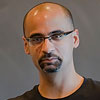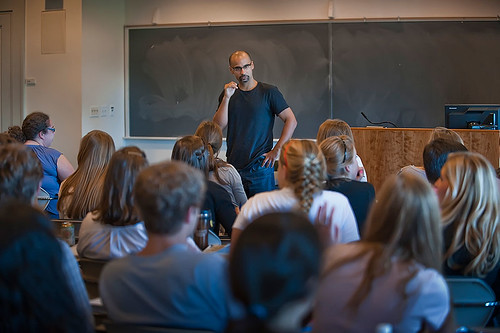 A humble Junot Diaz spoke candidly to a chock-full Love Auditorium Thursday night as he read short passages from his work and then answered questions about everything from art to language to immigration.
A humble Junot Diaz spoke candidly to a chock-full Love Auditorium Thursday night as he read short passages from his work and then answered questions about everything from art to language to immigration.
The Pulitzer Prize-winning author kicked off the Living Writers course, which will bring a number of acclaimed authors to campus throughout the semester to interact with students in the class and give public readings.
“His is a voice for and of our time; a voice that makes us believe, unequivocally, in words,” said Jane Pinchin in her introduction. Pinchin and fellow English professor Jennifer Brice are teaching the course, which the late Professor Frederick Busch created in 1980.
 |
| Junot Diaz speaks to students in Colgate’s Living Writers course. The Pulitzer Prize winning author later gave a public reading that was streamed over the web. (Photo by Andy Daddio) |
Wearing a navy blue hoodie, Diaz engaged the audience with his lyrical prose as he first read from A Brief Wondrous Life of Oscar Wao, his 2008 novel that won a number of awards in addition to the Pulitzer.
“There is only so much you can hear from one fool,” Diaz said as he switched to a reading of “The Sun, the Moon, the Stars,” a short story that first appeared in The New Yorker.
“I must confess, I love Santo Domingo,” he read, speaking about the country from where he immigrated with his family at the age of 6. “I love the plane landing, everybody clapping when the wheels kiss the runway. I love the redheaded woman on the way home to see the daughter she has not seen in eleven years — the gifts she holds on her lap like the bones of a saint.”
|
Afterward, Diaz answered questions from the audiences — both in Love Auditorium and those watching online. The reading was streamed live over the Internet for alumni, parents, and anyone interested in participating. Online viewers could submit questions to the moderator via interactive chat.
Questions submitted online came from an alumna, a student on campus, and even Venezuela. Alexandro, a first-year contemporary literature student at the University of Andres Bello in Caracas, asked Diaz for reading recommendations.
“Cormac McCarthy and Toni Morrison are some of the most important living American writers,” Diaz answered.
When asked by a student in the audience if Diaz thinks that a writer needs to compromise his ingenuity to sell to the public, the often unconventional author answered: “The reality is that, chances are, as writers, we are going to live marginalized, little-known lives, and in that way, it is an invitation, a call to arms, to be different, to be new, to bring a weird, radical genius to the work.”
Students in the Living Writers course had the chance to pick Diaz’s brain earlier in the day during class. Diaz, who is also a creative writing professor at MIT, is no stranger to being in front of students.